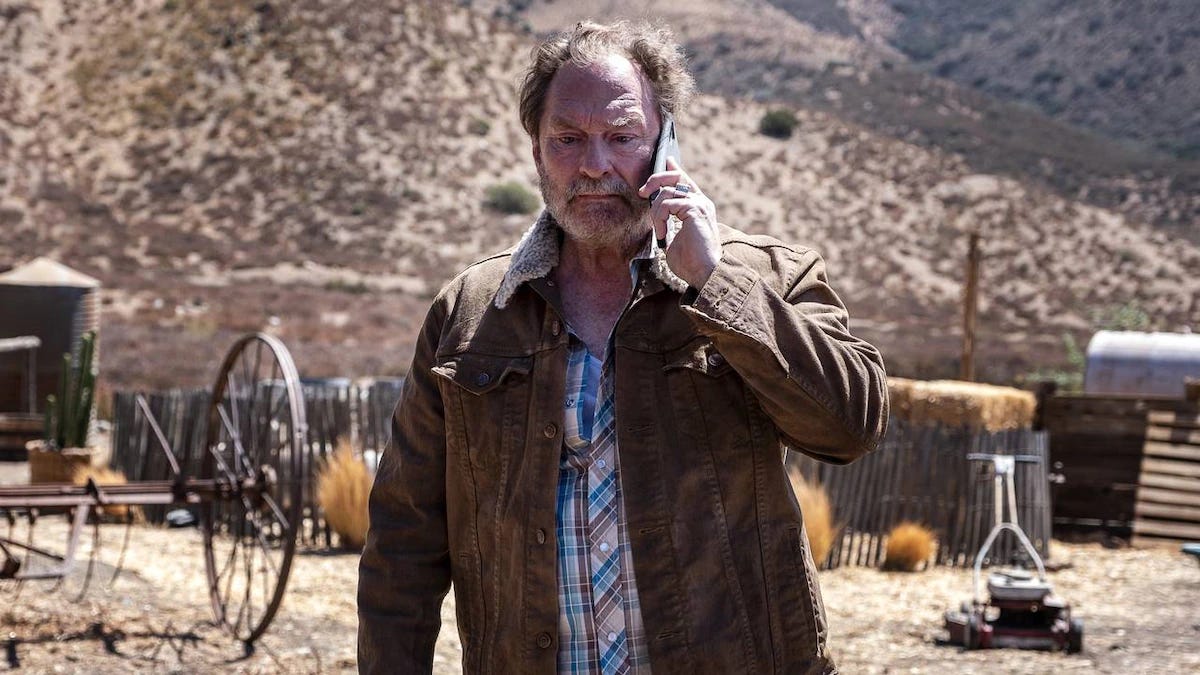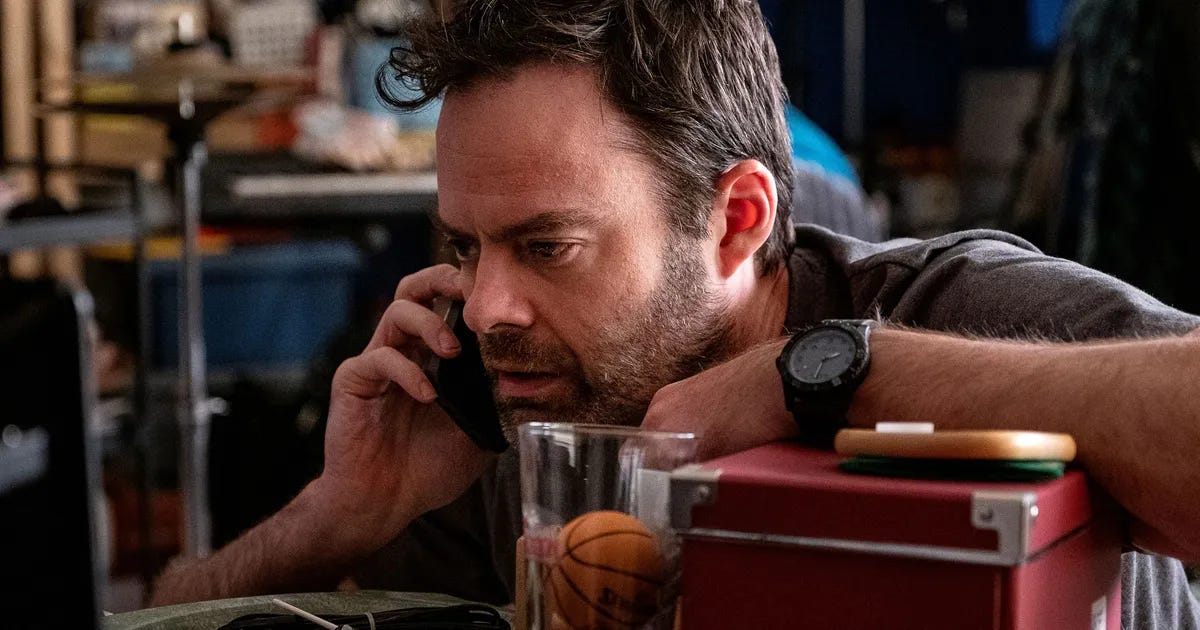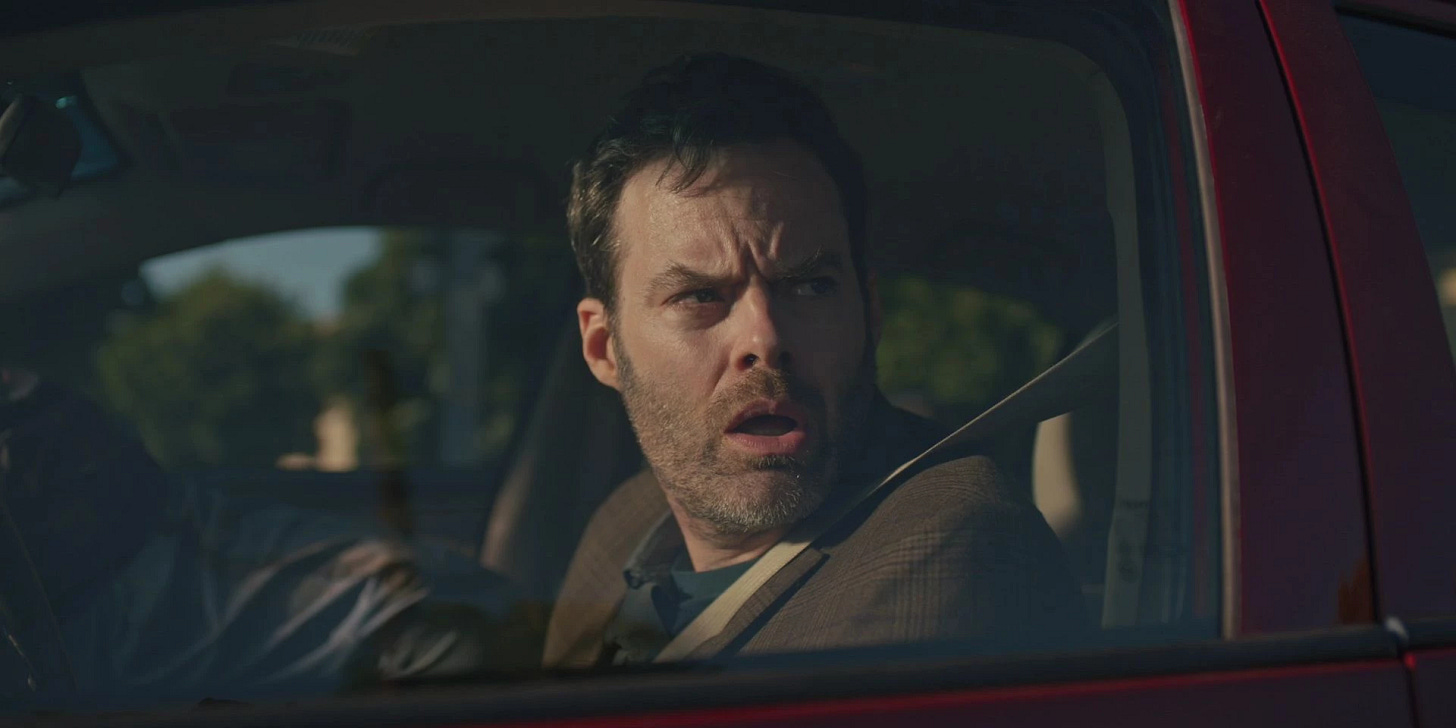How HBO's 'Barry' hit a television show home run this week
The second season in a row where Bill Hader and company blow us away.
The latest episode of HBO’s “Barry” this past Sunday started out with a man standing in the middle of the desert looking up at a hill, trying to convince a dangerous group of dirt bikers that a hot tub could fit on top of it. Things turn sour quickly, and the man is shot and left for dead. At the end of the episode, another character is drugged and also seemingly left to die.
Two men surviving separate, yet connected life-threatening attempts may only represent a small part of the dark comedy series-but this last episode proved that knowing little doesn’t take away from the wildness of the hour. It’s the wild in “710N,” the sixth episode of the third season, that makes it great.
This is also where I will point out that *SPOILERS* are very much straight ahead in this article, so beware and don’t complain online about it.
The man looking up at the hill is Stephen Root’s Fuches, the mastermind behind the turmoil in the show’s lead character, Barry Berkman, who is played by Bill Hader. He is the one who took Barry, fresh out of the military, and into becoming a hitman. When the gun for hire decided to become an actor-an event that kicked off the whole series-the relationship between the two men became strained. Over the next three seasons, it has only gotten worse.
Fuches wants Barry to be a machine and kill for him, even if it lands him in the middle of a war between two gangs from different countries. Barry wants to be a good boyfriend to his actress girlfriend Sally (Sarah Goldberg) and continue to act, but can’t escape his killing past.
On the other side of the coin from the “Barry/Fuches” relationship is the mentorship (that eventually bled into a father figure) and relationship between acting coach, Gene Cousineau (the brilliant Henry Winkler), and Barry. These two duos butt heads for the entire series, an inner war that has raged during this current third season.
Fuches is now trying to out his friend, who has struggled to keep his double life (the killer part of it at least) quiet from Sally and Gene. This involves the rogue killing of Gene’s girlfriend and detective last season, something that has driven a wedge between him and his former student.
But what makes “710N” so memorable is how much it says about Hollywood and post traumatic stress disorder without actually saying or shouting about it--and how it does that in less than 30 minutes. Also, how it becomes disbanded from the heart of the show’s plot while staying connected to it in a very comedic way.
In short, this latest episode is absolutely bonkers from start to finish. Fuches has bargained one fallible bridge too many in helping the Taylor biker gang (whose family member pulled a job with Barry and died last season) track down his old pal, even if he’s doing it in a very indirect, messed-up “Fuches” manner of helping. It ends with the leader of the gang shooting him, taking his contact info and going after Barry.
After we leave the desert, the audience is taken back to Sally, who is meeting with an executive for a new screenwriting or showrunner job. This comes on the heels of BanShe, aka Netflix in this show’s world, canceling her passion project, “Joplin,” earlier this season. The cutthroat effect in full swing.
In a scene that is extremely funny for everything it implies, three women communicate their needs with sounds, gestures, and different usages of simple words. When the talent executive tries to hand off a show to Sally, the same one that bumped “Joplin” off the main page and into oblivion, she does it by saying something like this:
“If the show is a ‘yeah’ right now, we want you to make it a ‘yeah!!’ kind of show.”
Sally’s agent responds with her own description of her client’s needs:
“Sally can either be ‘no’ or (smiles wide).”
This continues for a few minutes. It’s hard to describe succinctly, but this is the creators of “Barry” telling you how communication could be today in the world of studios, financiers, and talent. Another sly, well-written and supremely acted scene that nails an aspect and perspective without beating us over the head.
Later on, our protagonist is driving over to a dinner that he thinks is with his former military buddies, when the Taylor gang pulls up alongside his car. Moments later, guns are pulled and a chase begins. The genius in “Barry” is that you wouldn’t think it’s a cornerstone location for action sequences, but the stripped-down manner of their fights and gunplay is what makes it fit so well.
Barry is racing three dirt bikes down the road in a sedan, feverishly using his combat skills to outsmart them, even if it involves smashing into a phone pole. Then, it becomes a race between a man on foot and two bikers. We see a wide shot of Barry walking nervously through a car dealership while the bikers ride up on top of the building. But it’s not Barry who shoots the armed biker; it’s the manager of the dealership.
But waiting on Berkman to race up the freeway is the gang leader of the Taylors, the one who also shot Fuches. Again, the surreal blend of comedy and action plugs this scene with jewels. As Barry races towards him, the shooter somehow misses him with every one of his shots from the high-artillery machine gun. And then, in a desperate attempt to catch him, tries to hand off the same (very heavy) machine gun to his fellow gang member, who has been in pursuit of Barry for the whole scene.
He reaches up for it, misses and drops the gun, and gets flipped twice over a car.
After all that, Barry arrives at the home of Chris’ wife. Remember the almost-innocent Chris from the second season. The one who tried to screw Barry over and got a bullet instead from his former military unit partner. He comes over to the widow of Chris for a get-together with old buddies, or so he thinks.
The special investigator working with the detectives to catch and arrest Barry, the same guy who also used to be in Barry’s unit-is onto him. Chris’ wife and the investigator could have hatched a scheme to catch him.
An obvious piece of info worth mentioning: Barry has NO idea the widow knows it was him that killed Chris. It’s only when Barry sits down and bites into a semi-fresh beignet (more on that in a minute) that he sees the fake business card that Fuches had made up to help victims find him. And then he looks up and sees the widow, who is carrying an devilish smile. He’s been drugged (if poisoned, there’ll be an antiserum shot in the next episode) and passes out.
That’s how the episode ends. It starts with a murder attempt, and very well could end on one. Neither were successful, but still an exhilarating set of bookends.
Now, about those beignets. Throughout the episode, just about every major character stops by this new bakery in Los Angeles. The head chef, who looks like he smoked whatever Cheech and Chong missed, cracked the code on the famous New Orleans sweet treat recipe. But he’s not just a chef; he acts as a shrink for his customers.
He talks Sally through her big meeting, and urges Barry to get more info about the dinner before just heading over there. He also finds time to help the hopelessly in love Hank, who is coached on avoiding red flags in potential boyfriends. And Sally’s agent nearly decks a woman for stealing her beignets, which Sally acquired. It’s a warped-in-the-best-way sort of scene, one that makes you wish there was a philosophical baker out west.
Not since the second season’s brilliant “Pine Barrens” type episode, “ronny/lily,” has one single episode of television-30 minutes or less-created such an experience.
Go watch it. If you haven’t watched a single episode, do it anyway. Watch the early recap of recent events, and maybe watch the trailers for all three seasons. Then, hit play and sit back.
When TV creators get it right, they create a brilliant short film, one edited better than any film could ever dream of being as tightly wound and structured.
Thank you, Alec Berg and Mr. Hader. That was brilliant.






